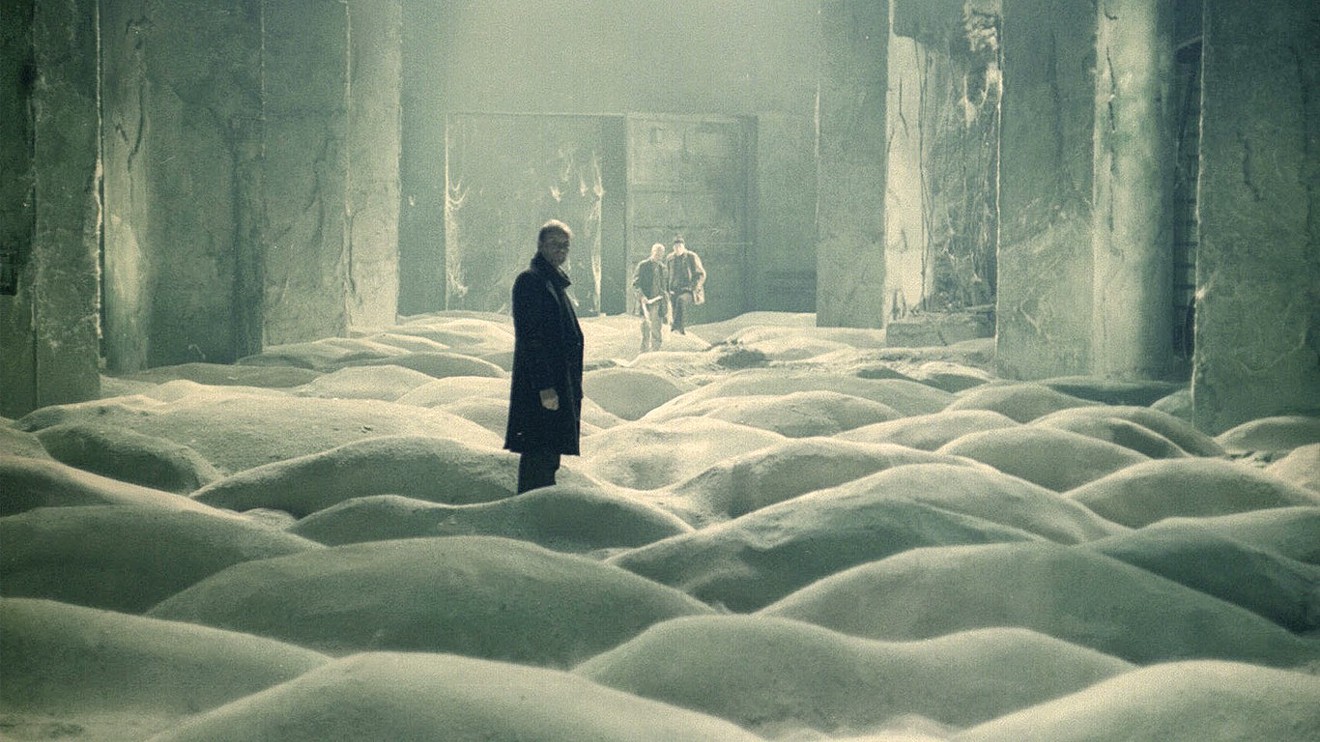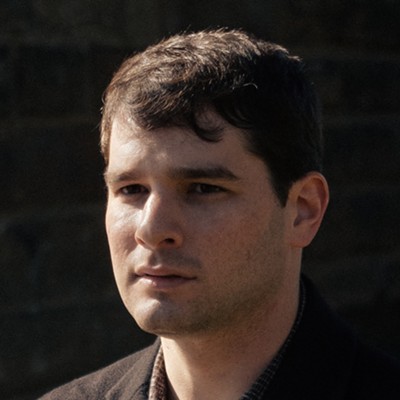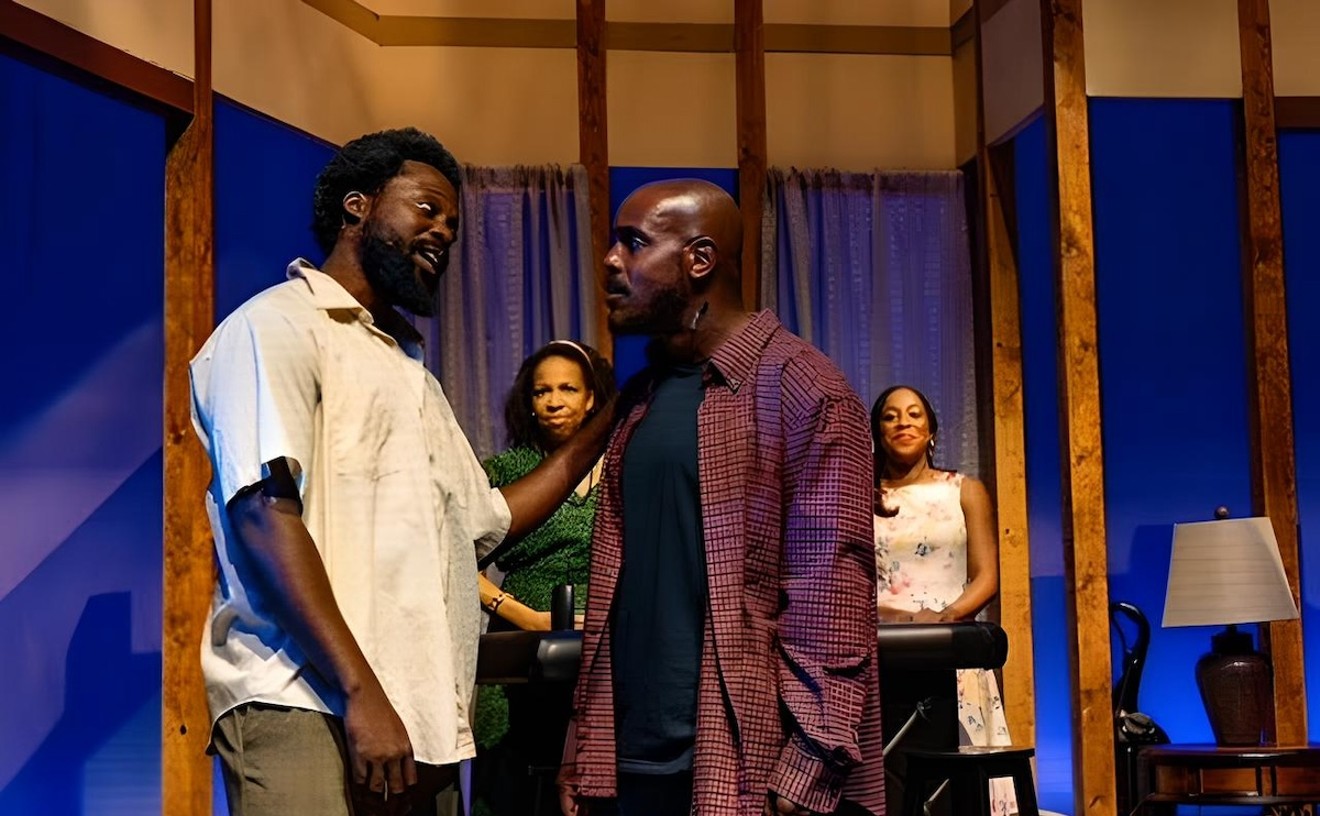Opening at the Coral Gables Art Cinema this week is one of the most essential, relevant films you’ll see all year — and it's 38 years old, 2 hours 40 minutes long, and Russian. It was made by Andrei Tarkovsky, a celebrated Soviet director whose fans range from fellow filmmaker Ingmar Bergman to pop star Frank Ocean. It’s called Stalker, and it’s about a world where everything is constantly changing and nothing is as it seems — a post-truth world.
The film begins in a dirty provincial town. The water is filthy, the roads and buildings are covered in trash, and a factory belches smoke into the sky. But near this town, guarded by barbed-wire fences and armed guards, is the Zone, a place of strange powers. In the Zone, circumstances change by the minute. From moment to moment, down can turn to up, left to right, living to dead. Flowers don’t smell like anything, and intruders hear voices in their heads. Yet strange treasures can be found in the Zone, and individuals called stalkers guide people through it.
Since Donald Trump was elected president, the strongest current in the torrent of salacious political stories is that of Russian interference in the election. The exact nature of the Trump campaign’s relationship with Russia, which hacked the Democratic National Convention last summer, remains to be seen. Something is amiss, though. The American people were never fond of the Ruskies, but our relationship with them has hit a perplexing new low. However, the two countries are more similar than you might think.
Each day, we receive a new battery of scandal and lies from Washington, yet it seems that very little is being done, or can be done, to stop these forces of power. All of this went on in Soviet Russia. In the '70s and '80s, that country’s economy was in shambles and its government was hopelessly corrupt. But because no one could imagine any other way to function, the state acted as though nothing was wrong. For regular people, what the government said contradicted the malaise around them, but criticizing the government meant a one-way trip to Siberia. Little by little, people adjusted to living in a world of lies. Life became hopeless, and one of the few ways people could express the state of things was through science fiction.
Enter Stalker. Adapting their novel Roadside Picnic, screenwriters Arkady and Boris Strugatsky devised a powerful metaphor for life under Soviet oppression. In one view, the unpredictable nature of the Zone mirrors that of the fake society the Soviets had created. Documentarian Adam Curtis called it a “picture... of a world where nothing was fixed” that expressed “the strange mood that was rising up as the Soviet empire collapsed.” In another interpretation, the Zone is a metaphor for the fabled West, with the characters entering while dodging bullets as if crossing the Berlin Wall. Naturally, U.S. viewers might see it as a version of the foggy haze of fake news looming over the White House.
But there's hope too, especially for Americans discouraged about politics. Though Tarkovsky shoots the scenes outside the Zone in a dingy sepia, the Zone itself is in color. Rather than the alien ground zero of the book, the Zone is a landscape of abandoned buildings, a proto-Chernobyl with powers that seem less extraterrestrial than magical. The stalker (Aleksandr Kaidanovsky) guides two guests to the Room, where it’s said one’s innermost wish is granted as long as they believe in it. He doesn’t go in himself, however; for him, the reward is being able to show people to the room and give them the hope they lack in the outside world. Maybe this is the real purpose of the Zone: a vision of a different, more hopeful future, something you have to believe in to make possible.
Stalker, it should be said, is not the easiest film to watch. Tarkovsky had few resources, so there is very little in the way of action and special effects. Much of the dialogue is given over to philosophical digression as the characters traverse the Zone. But the rewards of opening one’s mind to a film like this outweigh the costs. It’s not a Marvel movie or a mindless popcorn flick, but a work of art with its own strange, relaxing rhythm. Give it a shot: At the very least, it's three hours away from our own Zone.
Stalker
Friday, June 23, through Thursday, June 29, at Coral Gables Art Cinema, 260 Aragon Ave., Coral Gables; gablescinema.com; 786-385-9689. Tickets cost $7 to $11.75 via gablescinema.com.
At 7 p.m. June 27, New Times and Independent Ethos film critic Hans Morgenstern will join Gables Cinema associate director Javier Chavez and Miami Jewish Film Festival director Igor Shteyrenberg for "In the Zone: The Mysteries and Revelations of Andrei Tarkovsky," a panel discussion of Tarkovsky's films, including Stalker. Admission to the discussion is free.
[
{
"name": "Air - MediumRectangle - Inline Content - Mobile Display Size",
"component": "19274298",
"insertPoint": "2",
"requiredCountToDisplay": "2"
},{
"name": "Editor Picks",
"component": "17482312",
"insertPoint": "4",
"requiredCountToDisplay": "1"
},{
"name": "Inline Links",
"component": "18711090",
"insertPoint": "8th",
"startingPoint": 8,
"requiredCountToDisplay": "7",
"maxInsertions": 25
},{
"name": "Air - MediumRectangle - Combo - Inline Content",
"component": "17482310",
"insertPoint": "8th",
"startingPoint": 8,
"requiredCountToDisplay": "7",
"maxInsertions": 25
},{
"name": "Inline Links",
"component": "18711090",
"insertPoint": "8th",
"startingPoint": 12,
"requiredCountToDisplay": "11",
"maxInsertions": 25
},{
"name": "Air - Leaderboard Tower - Combo - Inline Content",
"component": "17482313",
"insertPoint": "8th",
"startingPoint": 12,
"requiredCountToDisplay": "11",
"maxInsertions": 25
}
]












